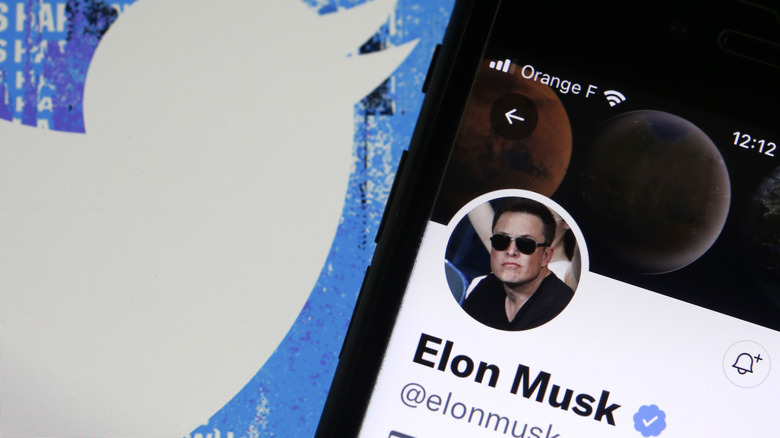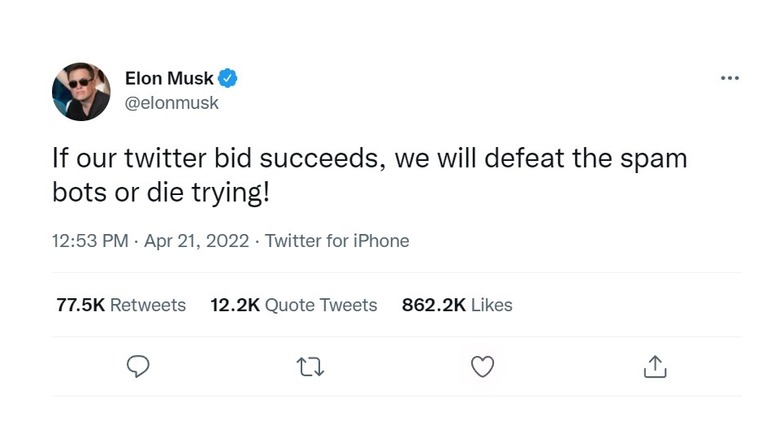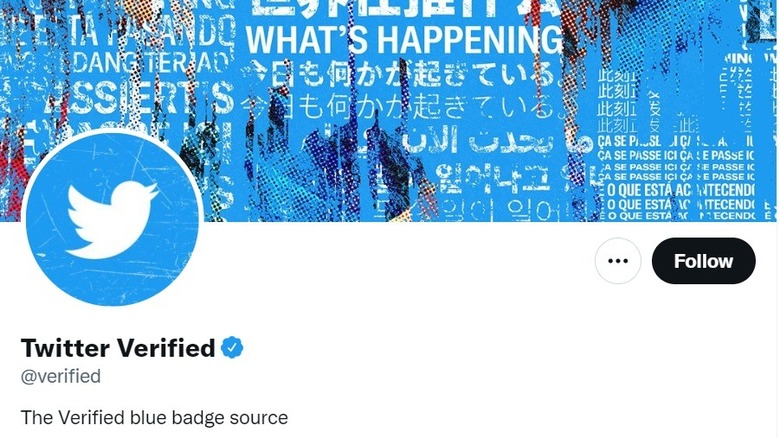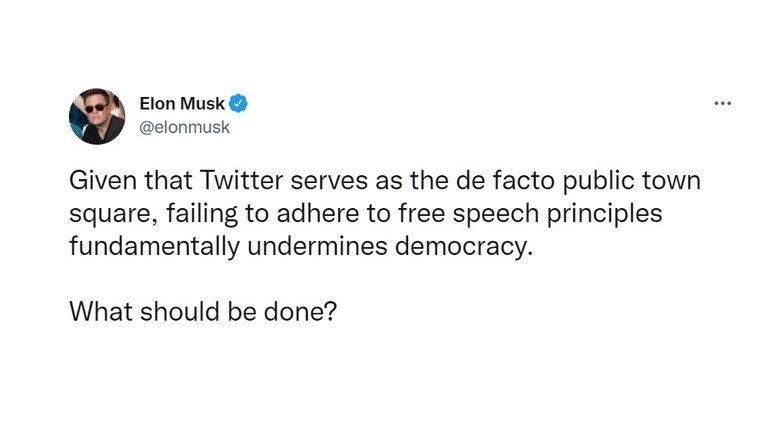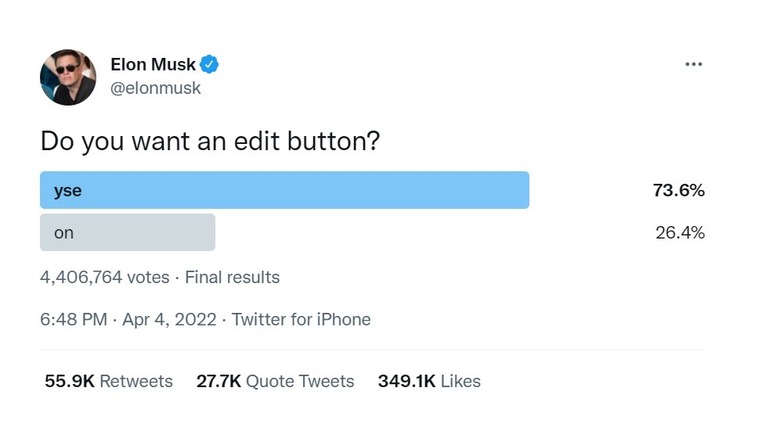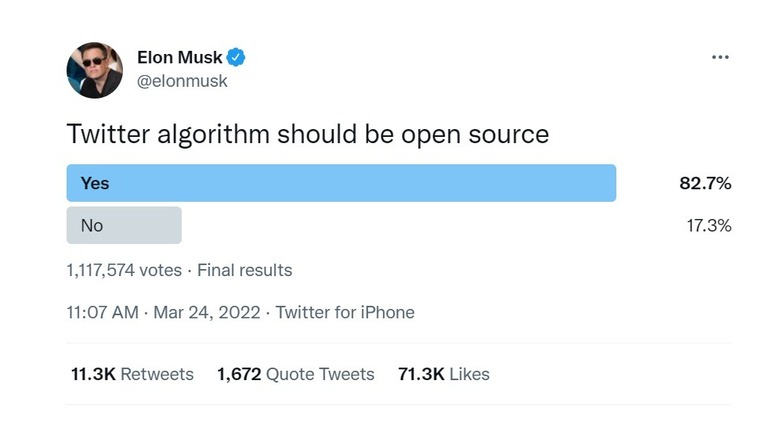Everything That's About To Change After Elon Musk Buys Twitter
Elon Musk isn't just the CEO of Tesla and SpaceX, he's also an influencer. At time of writing, he has more than 85 million Twitter followers, putting him on par with pop stars and heads of state. Although the platform has worked to Musk's advantage, blasting out his thoughts to tens of millions 280 characters at a time, recently he's been a vocal critic of what he sees as shortcomings in the way Twitter operates.
In early April of 2022, Musk set out to influence not just Twitter's user base, but also its board, when he acquired 73,486,938 shares of the company. The purchase gained Musk a 9.2% stake in the company as well as a seat on the board, which he promptly turned down (per CNN).
At the same time, Musk made an offer to buy Twitter outright and turn it into a private company, a move which would give him the power and authority to shape it as he sees fit. On Monday, April 25, 2022, Twitter's board unanimously agreed to a $44 billion deal for Musk to buy the company at $54.20 per share.
The deal isn't set in stone just yet. It still needs to be approved by shareholders and go through regulatory approvals, but all of that is expected to be completed sometime in 2022. Unless something unforeseen halts the proceedings, we might see some significant changes to Twitter in the coming months and years.
Combatting an army of bots
Twitter reports quarterly on the number of bots populating the site, and estimates they make up about 5% of the total accounts on the platform. According to a study from researchers at Indiana University and the University of Southern California, however, the true number could be 15% or higher. Nailing down actual numbers can be challenging, as bots have become more sophisticated and better at mimicking humans.
For years, there have been concerns that bots are spreading misinformation on various social media platforms, including Twitter, and bending the public conversation about politics and public health, (per NPR).
On April 21, 2022, Musk stated via Twitter, "If our twitter bid succeeds, we will defeat the spam bots or die trying!"
It's important to note that not all bots are bad. Some are harmless and fun, while others can be quite helpful. The account @big_ben_clock, for instance, simply denotes the time once an hour with the appropriate number of bongs, while @earthquakeBot alerts you to any earthquake larger than a 5.0 on the Richter scale, using data from the United States Geological Survey.
Much like people, we can't paint all bot accounts in Twitter with a broad brush. Ridding the site of bots might improve the quality of discourse on the site, but any sweeping gestures could also impact accounts which objectively improve the user experience.
A new process for authentication and verification
Twitter's blue check mark tells the world both that an account is authentic—tied to a real individual or brand—and that it is of public interest, (per Twitter). Consequently, getting a blue check quickly became something of a status symbol on the site.
Problem is, Twitter's verification process is poorly understood and seemingly inconsistent. To most users, it is unclear why some people have a check mark while others do not. That's something Musk intends to change, if the buyout is approved.
In a now-deleted tweet, Musk has stated that "Everyone who signs up for Twitter Blue (i.e. $3/month) should get an authentication checkmark" (per Outsider). Later, in a response to Twitter user @PPathole, Musk confirmed the plan would be "something like that."
In a follow-up to Musk's initial statement, which has since also been deleted, Musk clarified that authentication gained via Twitter Blue would be notably different than the current verification indicator. That could mean differing colored checks or symbols. Precisely how accounts will be segmented is, at the moment, unclear.
Musk's desire to authenticate all human accounts goes hand in hand with eliminating bots, essentially aiming to assure users that the people they are communicating with are, in fact, real people.
Looser content restrictions
Musk has been open about the fact that he thinks Twitter unfairly enforces moderation against some kinds of speech while allowing others. A tweet on March 26, 2022, criticized what he sees as Twitter's unequal enforcement of content guidelines.
Musk expanded on those views during a with the head of TED, Chris Anderson, on April 14, 2022. At the time, Musk's offer to purchase Twitter was breaking news, but it's clear he was already thinking about how things could change.
"Twitter has become kind of the de facto town square, so it's just really important that people have both the reality and perception that they're able to speak freely within the bounds of the law," Musk told Anderson.
He further clarified that removal of content under his version of Twitter would be less common, stating, "If it's a gray area, I would say let the tweet exist... I'm not saying that I have all the answers here, but I do think we want to be very reluctant to delete things," Musk said.
As explained by USA Today, If Musk adheres to an absolutist free speech ideal, it could mean an increase in hate speech and harassment on the site, something Musk appears to be comfortable with or at least resigned to.
"A good sign as to whether there is free speech is: Is someone you don't like allowed to say something you don't like? If that is the case, then we have free speech," Musk said.
An edit button
On April 4, 2022, the same day Musk acquired 9.2% of Twitter, he tweeted a poll to his tens of millions of followers which asked, "Do you want an edit button?" with the options being "yse" and "on," a clear jab at Twitter's current inability to edit a tweet once it has been posted. At the time of this writing, there are approximately 4.4 million votes with 73.6% of respondents voting "yse."
The ability to edit a tweet has long been a top ask from Twitters users. Other platforms like Facebook and Instagram allow it, but Twitter has been resistant. Part of that resistance comes from the potential for abuse.
As explained by Bloomberg, we could see scenarios in which a seemingly innocuous tweet is favorited, retweeted, and quote tweeted millions of times, only for the content of the original post to be altered to something offensive or damaging after the fact.
During Musk's TED conversation with Chris Anderson, he suggested a potential solution to this problem. "You'd only have the edit capability for a short period of time and probably the thing to do upon the edit would be to zero out all retweets and favorites. I'm open to ideas, though."
If implemented in this way, it could allow for quick corrections of typos while reducing the potential for harm. If and how an edit feature makes its way to Twitter remains to be seen.
Reveal the algorithm
Perhaps the most ambitious change Musk hopes to make to is sharing the site's algorithm, making Twitter's inner workings wholly transparent. Ultimately, the desire to share the algorithm ties back to Musk's inclination for absolute free speech, within the confines of the law, by making it clear to anyone when and how things are modified.
The algorithms of most social media platforms—and most websites at large—are black boxes leaving users to speculate how and why content is promoted and shared with their followers and friends. Musk believes that should change, at least at Twitter.
"One of the things I believe Twitter should do is open source the algorithm and make any changes to people's tweets—if they are emphasized or de-emphasized—that action should be made apparent so anyone can see that action has been taken," Musk suggested during his TED conversation.
Sharing the algorithm with the wider public could do more than just make Twitter more transparent, it would also allow Musk to crowdsource improvements to the site. "I think the code should be on GitHub so people can look through it and say 'I see a problem here. I don't agree with this.' They can highlight issues and suggest changes," Musk said.
Many of the changes Musk is suggesting sound perfectly reasonable on the surface but having the de facto town square, as Musk describes it, in the sole hands of the world's wealthiest individual has many people understandably nervous about Twitter's future. While some of those reactions have been humorous, others have focused on whether Musk's priorities as an outspoken billionaire will match up to those of the rest of its users.
